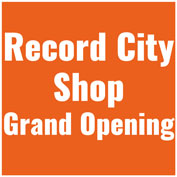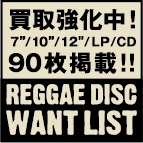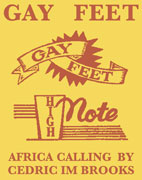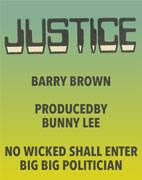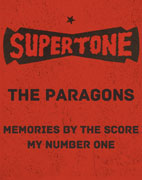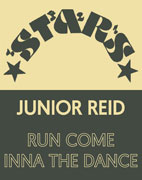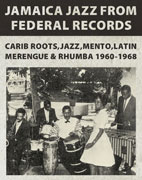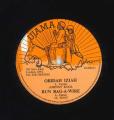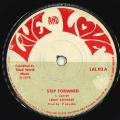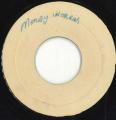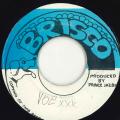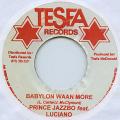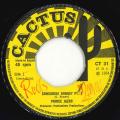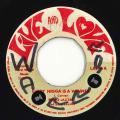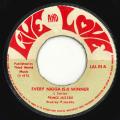Prince JazzboText by Harry Hawks
One of the most distinctive deejays of the seventies who, in the following two decades, carved out a similarly successful second career as a record producer.
Prince Jazzbo
| Real Name | Linval Carter |
| Born | Sep 3, 1951 |
| Died | Sep 11, 2013 |
| Place of Birth | Chapeltown Clarendon Jamaica |
| Related Artist(s) |
Increasingly drawn towards the world of sound systems Jazzbo's favourite sounds in Clarendon were Brisco Hi Fi, which belonged to his uncle, and Franklyn Brown's sound Brown Disco. On the Spanish Town circuit he followed Killer Whip, Wasp The Almighty and Ruddys Supreme Ruler Of Sound and his interest in actually becoming a deejay began with Sedrack sound. Jazzbo cites DJ Wicked from Ruddys and El Mango as his biggest influences. By the age of fourteen Jazzbo was a regular mic. man for Killer Whip. He had received a lot of encouragement along the way from Whip, the sound owner, and producer Glen Brown but Jazzbo's aunt actively disapproved of his love of music and sound systems. She felt so strongly about it that she turned him out of her Spanish Town home and, by the age of thirteen, Jazzbo was, literally, living on the street: "I don't know what it means to be anything but a survivor and I don't want to know anything else".
Spanish Town, New Years Eve 1970: In the crowd at a sound clash dance between I Roy on the mic. for Ruddys and Prince Jazzbo for Killer Whip was none other than Clement 'Coxsone' Dodd(CS Dodd). He was so impressed with Jazzbo's performance that he asked him to come down to Studio One the next morning. Jazzbo met with Mr Dodd a few days later but had to wait a fortnight until he was able to voice Burning Spear's 'Door Peeper'/'Door Peep Shall Not Enter' rhythm. The record entitled 'Imperial I', Prince Jazzbo's first, was released six weeks later. The Prince stayed with Mr Dodd at Studio One for the next "two and a half to three years". Jazzbo released a number of classic singles for Studio One on the Bongo Man label including 'Crab Walking', 'School' and 'Pepper Rock' during this period. But Coxsone's album 'Choice Of Version', which showcased the Prince in fine style over some of Brentford Road's finest rhythms, remained unreleased until 1991.
As well as recording for other producers Jazzbo started to produce records for his own Mr Funny, Count 123 & Brisco labels in 1972. Glen Brown stepped forward again when, instead of paying Jazzbo $150 for 'Mr Harry Skank', his explosive version to 'Dirty Harry', they agreed on $75 and for Jazzbo to have a cut of Glen's 'Glen Brown At Crossroads' rhythm for his own use. His first self production was 'Crankie Bine' "voiced by King Tubbys at his Dromilly Avenue studio for free. I paid $35 for a set of stampers and $80 per hundred to press my first records." Jazzbo left twelve copies "on consignment" (sale or return) at Joe Gibbs Record Globe and twelve more at Randys under the same arrangement. But KGs at Cross Roads ordered twenty five copies, paid for them and went on to sell hundreds more to local record buyers. "The record was a success" and it paved the way for his second self production 'Wise Shepherd'.
The most vituperative of all deejays Jazzbo now began to make his mark with a series of classic self produced seven inch releases such as 'For Star', 'Mr Funny', 'Every Nigga Is A Winner' and 'Step Forward Youth'. There was never any room for misinterpretation on his records and the listener was left in no doubt as to what he meant and the message that he needed to deliver. Prince Jazzbo's vitriolic work was always focused and in deadly, dreadly earnest "I won't lay down or talk of foolishness... No time for negativity. No room for foolishness..." His long playing debut for The Upsetter, 'Natty Passing Thru', proved extremely popular when it was released in the UK on Black Wax and also in the USA where the Clocktower counterpart was entitled 'Ital Corner'.
The 1975 feud between Prince Jazzbo Spanish Town deejay Prince Jazzbo remains one of the most talked about episodes in the history of Jamaican music. Jazzbo recalled the beginning of the recorded rivalry:
"I had gone to King Tubbys studio. When I arrived I saw I Roy with Bunny Lee, Tappa Zukie and Scientist. Tubby was preparing to voice I Roy and as he 'set up' and balanced I Roy he pressed the 'record' button. It started as a 'run down' and I Roy began insulting me on the microphone. Everyone in the room laughed except me! Bunny Lee said he was going to release the tape.....and he did! This was the origin of the tracks".
He never liked the idea at all but he had no choice to respond as "it was just like a sound system duel" and Jazzbo gave as good as he got with 'Straight To I Roy's Head' and the barbed 'Gal Boy I Roy'.
Jazzbo then spent three years in London where he established the Ujama label. "Ujama is Swahili for self help....it was hard for small people to do business" and on his return to Kingston began to produce "a lot of little youths" for his label. As computer driven rhythms came to the fore the Ujama label, which proudly proclaimed "Made in Jamaica by Rasta Man", was to be found at the cutting edge of this revolutionary new music. Horace Ferguson's 1983 release 'Senci Addick' was one of the first breakthrough digital hits. An excellent U Roy version 'Music Addick' followed and a Jazzbo produced U Roy album 'The Seven Gold' was later given an international release as 'Music Addict' on RAS. Prince Jazzbo "always lived good with everybody" and he later voiced his old rival I Roy for Ujama and up and coming deejays such as Cobra and Papa San. Veteran vocalists also appeared on the label including Dennis Walks and Freddy McKay alongside newcomer Frankie Paul whose 'Here We Go Again' on the 'Rubber Dub Market' album is one of his best ever. The Ujama label was seriously prolific... raw, basic and unadorned the majority of these stark recordings now sound even better than they did at the time... and they sounded really good then.
One of the most original and provocative deejays of the seventies Prince Jazzbo's work as a producer in the eighties and the nineties proved to be every bit as forceful... and successful. His longevity in a business famed for its rapid turnover of talent is a testament to his unwavering stance and commitment.
Date Added: May 02, 2011 / Date Updated: Jan 30, 2014
Copyright (C) 2024 Dub Store Sound Inc.
Related Item(s)
| Johnny Kool; Jah Tony - Obidah Iziah; Run Bag-A-Wire( Ujama UK)EX--/SEW/HWOL |
B side) Prince Jazzbo, Brimstone; Prince Jazzbo - Learn Some More; I A Roots
| Leroy Stewart - Step Forward(Live & Love UK)VG++/SLD B:WOL |
B side) Prince Jazzbo - Step Forward Youth
| Ernest Wilson - Money Worries(Coxsone-Pre)EX--/SEW/WOL/stain B:SOL |
B side) Prince Jazzbo - Creation Skank
| Prince Jazzbo - Every Nigga Is A Winner(Live & Love UK)VG-/WOL/SOL/NOC |
| Prince Jazzbo - Every Nigga Is A Winner(Live & Love UK)VG+/NOC/edge damage |





